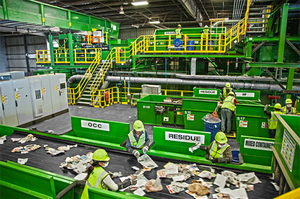A draft plan pinpoints four strategies to cut city waste.
As Minneapolis continues its move towards zero waste, it has a new target: student housing complexes.
The city’s Zero Waste Draft Plan sees boosting recycling at apartment buildings, particularly student housing facilities, as a key way to boost the city’s metrics.
Kellie Kish, recycling coordinator for the division of solid waste and recycling within the city’s public works department, told the Minnesota Daily that many residential buildings around the University contract with private haulers.
“The services offered to larger, multi-unit buildings may not necessarily equal what is offered to those in the smaller buildings that [the City provides] service to,” Kish said.
Kish was a Waste360 40 Under 40 award recipient in 2016.
Hennepin County, Minn., had a recycling rate of 46 percent in 2015, which is pretty far behind its goal of achieving 75 percent by 2030. And in an effort to boost its recycling efforts, the county conducted a waste study in 2016 to find out which items were being thrown into the trash bin instead of the recycling bin. The results of the study revealed that food waste made up the majority of the bins.
To help keep that food waste out of landfill, the county made plans to move half of its recycling dollars toward organic waste by 2020 via a new funding policy. The county also expanded its curbside organics recycling program citywide, and by the end of 2016, more than 42,500 Minneapolis households had signed up for the voluntary program.
The Minnesota Daily has more:
The draft plan pinpoints four strategies to cut city waste: conducting regular waste sorts to determine progress, giving extra resources for outreach and education, establishing funding for sustainable programs to aid implementation and encouraging source reuse and reduction.
Hodges initiated the development of the zero-waste plan during her State of the City address in 2015. In June 2015, the city council established a goal of recycling and composting 50 percent of citywide waste by 2020 and 80 percent by 2030.
Ward 2 City Council Member Cam Gordon said cutting waste from apartment buildings — like those near the University — is a key step in meeting these goals.
“When we decided we really wanted to get a handle on our waste and start reducing it and getting close to zero, we realized that [student housing is] an area we really have to figure out if we have any hope of getting there,” Gordon said.
About the Author(s)
You May Also Like


